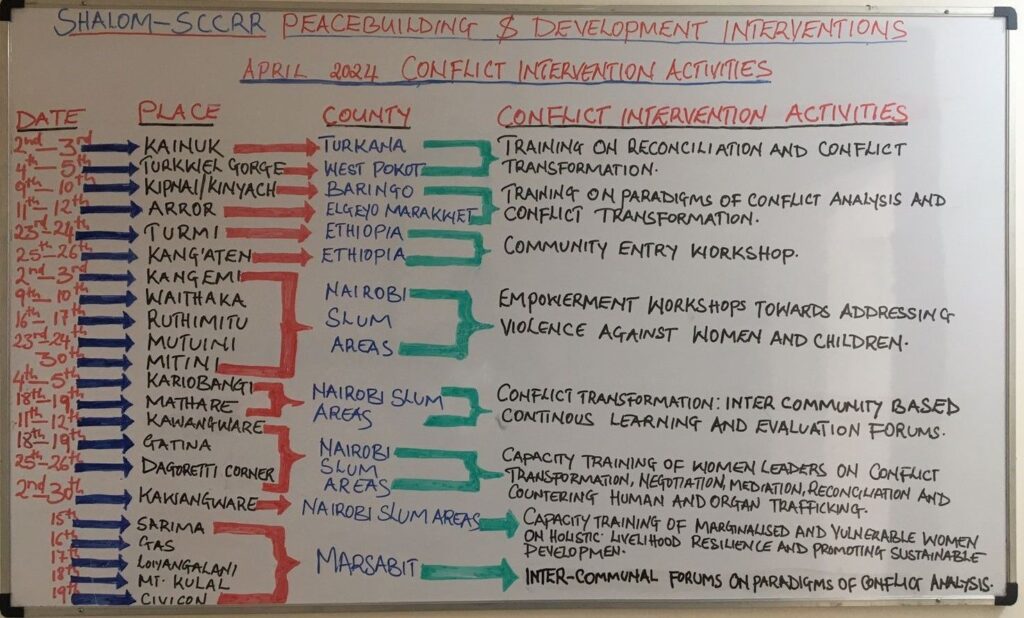
SCCRR facilitators with Chief Daniel Ptyos and Joseph Ayomong (center left and right)
By Mary Koech
Shalom held a workshop on Conflict Mapping in Nyang’aita village which is located in Sigor Constituency within West Pokot County. The area is hot, flat and dry with most of the community members depending on livestock rearing for their livelihood. Predominantly inhabited by the Pokot community the village is not too far from their neighboring Turkana community. Thus the village has experienced conflict in the past with devastating effects; countless lives have been lost, livestock stolen, property destroyed and hundreds displaced. It was the first time that Shalom was conducting a workshop in Nyang’aita and the local community expressed their passion about peace initiatives and were happy to attend a SCCRR workshop.
Among the participants were Daniel Ptyos and Joseph Ayomong; two Assistant Chiefs from Amarel and Cheprirem Sub-locations respectively. Some of the disputes that the two assistant chiefs have mediated include family disputes between husbands and wives, disputes within the family over land inheritance and cattle raids. The most recent raid experienced within the larger area and affecting both the Turkana and the Pokot was about three months ago, in May, in an area called Nadome.
There have been numerous efforts to address the issue of cattle raids with political leaders moving around the affected areas to preach peace in various villages within West Pokot and Turkana counties. The leaders have visited Pokot-North, Turkwel, Lokichar, Kainuk and Kapedo but there is still a lot more to be done to find a long-lasting solution.
“There cannot be any development when there is conflict. Conflict has been a major setback to growth in our village. But when communities are brought together and coexist peacefully, then developments can go on. When there are peace initiatives that involve the communities directly then developments like schools, churches, businesses can flourish,” stated Chief Joseph Ayomong.

Chief Ptyos sharing his experiences with participants.
Adding to this, Chief Daniel Ptyos pointed out the difficulty in bringing warring communities together: “Because of past experiences and deep psychological and even physical wounds, community members would find it hard to agree to come together.” Ptyos appreciated the importance of a neutral third party to fast track the peace process. He added that Shalom Center for Conflict Resolution and Reconciliation is facilitating this, and that the organization has a great reputation in the peace process. “Political leaders have played their role in advocating for peace especially after the brutal attacks that ravaged Nadome a while back. Dialogue between the communities is ultimately the starting point for sustained peace which SCCRR facilitates,” he added.
Chief Ayomong went on to state that the knowledge provided by Shalom is very useful as it helps community members find ways of mitigating conflict and maintaining peace; he lauded Shalom for involving the elders, chiefs, women and youth in the workshops. “Chiefs and elders have the authority to call fellow chiefs and elders from other communities for talks and have influence on the actions of the community,” he stated.
Chief Ptyos concluded by emphasizing the importance of bringing conflicting communities together for dialogue. He requested that Shalom should plan for many other workshops targeting the same group and promoting Truth, Justice, Mercy and Reconciliation to other remote villages. He also commended SCCRR for supporting the building of inter-ethnic schools as children from waring communities can learn and live together building life-time bonds founded on the ideals of brotherhood and sisterhood.

